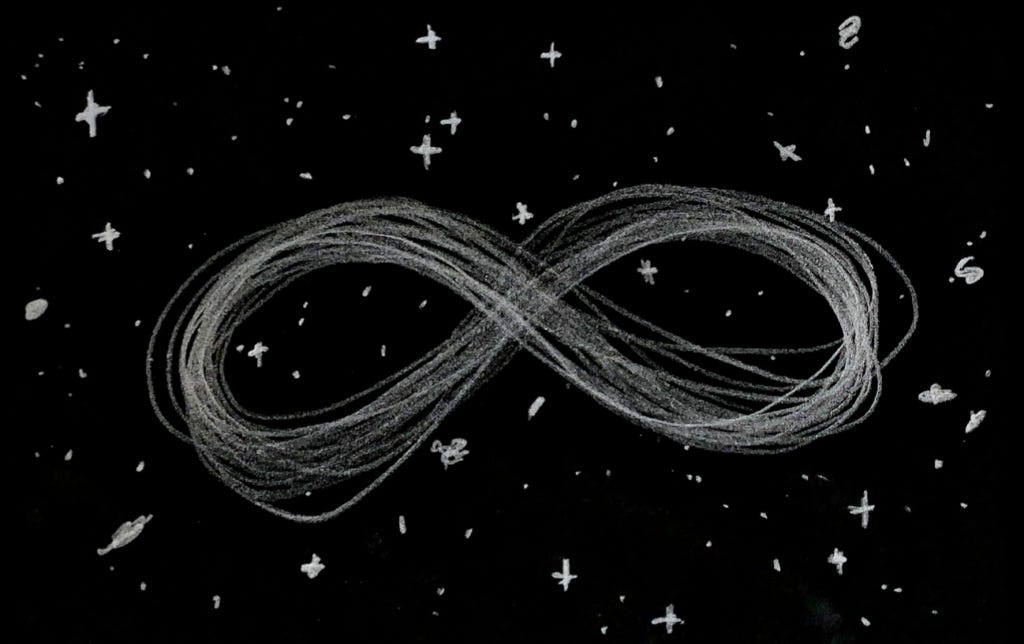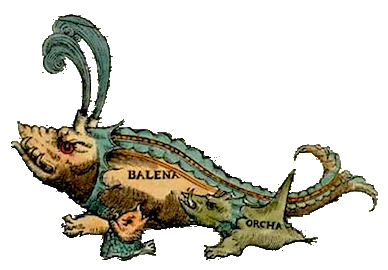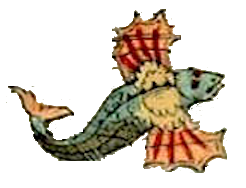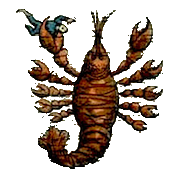The first three sections of this post were first published as part of an essay I wrote in August 2021, under the title “Feelings of Infinity.” The last section argues against it, in a way.
I grew up in a small suburb of a mid-size city. The suburb was my world: regular, recognizable, bounded. The center city, meanwhile, was a vastly richer world. Going downtown meant leaving what I knew to experience something infinitely bigger.
It is a great feeling, the feeling of infinity. It is the feeling that anything is possible, that there is so much to discover. That you can lose yourself in something greater than you are. It is, I think, a precious feeling.
Eventually I went to school in a more urban part of Quebec City. I was a teenager, and I gained more autonomy, explored more of the city, and met more of its people. The feeling of infinity subsided. Now the city was just a place, and one that I knew fairly well.
For college I moved to Montreal. Montreal is the core of Quebec’s culture, its nucleus, the city where all the important and interesting people live, the place that you see on TV. It is 3 to 5 times more populous than Quebec City, depending on how you count. When I began university, Montreal felt big beyond comprehension. It was bustling, overwhelming, brimming with diverse people. I would take the metro and emerge in a totally new neighborhood as if it was a new universe. The city was incredibly alive. It was the Place Where Things Happen.
Montreal was the place you saw on TV — but TV gives you just a glimpse of anything, and lets your imagination fill the rest. And yet imagination is limited, so when you move there, it feels gigantic, truly infinite.
I’ve lived in Montreal for more than ten years. Today it doesn’t feel infinite at all. It doesn’t feel small per se, and it objectively isn’t. It just feels finite.
Quebec City feels even more finite. Quebec as a whole feels finite now — because Montreal is by far its biggest place, and so there’s nothing else to “conquer,” so to speak. To get the feeling again, I would need to move someplace else. I could move to Toronto, the biggest place in Canada. I could move to the US — a big country, with big cities, surely able to sustain the feeling for a while. Perhaps I could try living in the giant metropolises of Asia.
Maybe cities aren’t the answer. I love cities, because they tend to offer a far richer experience than other places, but there is plenty of nature to lose oneself into, too. Yet that doesn’t ring very true to me, in part because I’m not a very outdoorsy person, but mostly, I think, because the closest we can get to infinity is through interaction with other humans. After a while, the natural world gets a little boring, a little predictable, in a way that grand and beautiful landscapes can’t compensate for. I think that’s one of the reasons why I quit my first field, which was biology: there was no longer any infinity to be felt in studying the natural world.
When I traveled to a sparsely populated region of Quebec, in the summer of 2021, I was struck by the finiteness of it all. The villages there often have about 200 inhabitants. With such small populations, everyone is the cousin or the sibling of someone you know — there is no illusion of an infinite number of people. The territory is big, of course, and felt more infinite than the culture and people; but not very much more. After all, we have good maps of everything, so there is very little room for the unknown. The landscapes of the north, while grand and beautiful, are repetitive and rarely surprising.

Both living and traveling somewhere “consume” your feelings of infinity. After you have known a place, it’s impossible for that place to generate the feeling again. No longer does Europe, where I lived for a year and a half, feel overwhelming. Gorgeous, interesting, yes, but not infinitely so.
To a person who has traveled in most of the world, there is no longer anywhere to get the full-blown, initial feeling of infinity. At most, there is outer space — and maybe that’s why some ultrarich people fancy taking flights into the orbit of the Earth. But space won’t save us either. In terms of pure volume, the universe is infinite, at least relative to the scales of a human life, but volume isn’t what we care about. The universe is almost devoid of culture and people. It is mostly empty, and anything that isn’t empty is mostly homogeneous: star plasma and smaller rock. I have had several phases of reading up about astronomy with avid curiosity, but eventually I grew less interested. There isn’t that much new stuff to see in the vastness of the universe. It can grant you feelings of infinity, but only for a time, like everything else.
In a finite world, the supply of infinity is necessarily finite.
Geography is the easiest way to illustrate what I’m talking about, but we can generalize far beyond that.
There is a meta layer to every human experience. Traveling to Paris and traveling to Tokyo may feel like two very different activities, but they’re both traveling. Recall the first time you traveled somewhere far and different (or, if you never did that, imagine the first time that you will). The excitement of being in a plane, right before takeoff, for your first flight; the exoticness of seeing everything written in a language you don’t understand. Those things can only be lived once. So even though I have traveled only in a limited part of the world — North America and Europe, mostly, with a tiny bit of Central America and of the Middle East — I don’t get a strong feeling of infinity anymore when I travel (which doesn’t mean I can’t enjoy it).
So it goes with every human activity — watching a movie, going to a party, having sex with someone, making a new friend, learning a language, getting a job, practicing a sport, writing a blog post. You can do these things infinitely many times, and there will always be variations, but they will not provide you with an overwhelmingly new experience each time. For every new type of activity you experience, your world gets a little more finite.
Are there enough sufficiently distinct types of activities to sustain a person’s feelings of infinity for their entire life?
It’s possible that there is. Unless something major happens, I expect to be alive for 50 to 60 more years. There are still plenty of types of experiences I’ve never tried, like raising a child, going to space, trying most drugs, or leading a company, and it’s conceivable that these things have the potential to fill the rest of my life.
But sometimes, especially when I’m feeling down, I worry that they won’t. That eventually, perhaps soon, I’ll have exhausted my supply, and will almost never feel infinity anymore. It worries me.
If a person’s lifetime feelings of infinity come in a limited supply, and depletion is a concern, what can we do about it?
The first path is to manage the resource. We can decide when and how to consume the feeling, like we can manage a limited supply of money.
This suggests that we should be smart about seeking new experiences. We shouldn’t try to sample all the foods and visit all the countries too fast — lest we become jaded and feel the world shrink. We should carefully manage how much we are exposed to the vastness of the world, so that it remains vast for a long time.
This sounds… fine, I guess. Smart management is good, but it’s also kind of lame. It prevents living to the fullest. Carefully managing a small amount of money is better than spending it all and cornering yourself into a bad situation — but if you can, it’s far better to make more money.
But perhaps the analogy with money isn’t good, because money is necessary to some extent for good living, while feelings of infinity are perhaps just a luxury. You can simply accept that at some point you will run out. So another path is to embrace the finiteness of the world. Find beauty and meaning in smallness. Enjoy the minute variations between different instances of an experience — movies, travels, sex, whatever you want — instead of seeking completely novel types of experiences.
I think in general it’s smart to be able to find happiness from a variety of sources, including the mundane. But feelings of awe, of infinity, can be transformative experiences; it would be sad if we got less and less of them as we grow and just resigned to our fate.
Maybe there is a way to engineer infinity, to add it to our lives when we lack it. Psychedelic drugs, which I’ve never tried, sound like they may be able to do that. Meditation, too. In fact that may be the main purpose of religion: to construct stories about something so much greater than we are — the divine — in which we can get lost.
Another possible way to engineer infinity is through art. Each new piece of literature, of film, of painting, can be a little fragment of infinity that we get to experience. And there is more art being created than we can consume; it is like the expanding universe, growing faster than we could ever travel even if we reached the speed of light.
Art forms are finite and always feel so after a time, even the vast ones like epic novel series or multi-season TV shows. But one great thing about art is that it attempts, by its very nature, to surprise and expand our experiences. The most successful artists make us see in ways we couldn’t before. New forms of art get invented, providing the new types of experiences I was talking about. So art is in some sense infinite — at least as long as artists make sufficient amounts of it.
And this brings us to the only true way to avoid shortages of infinity: expanding human civilization. Make more art. Invent more things. Make more humans, too.
Raising children seems like a good way to vicariously feel infinity. Everything is big and impressive for a child; watching them experience the world can give us a glimpse of what we once felt.
But the impact of having children is far greater than this. Having children means continuing and augmenting human civilization. It means more people who will make art and create new ways to experience life. It means more people who will create new subcultures and colonize planets and make more children in their turn to keep the cycle going, until one day we have reached all the stars that we can.
I didn’t expect this essay to become a defence of pronatalism, but here we are. More people is a good thing for many reasons; creating infinity may not be the main argument, but it’s a poetic one, which is perhaps more convincing than any of the others.

A Postscript, Fourteen Months Later
I wrote the above more than a year ago, under a different title. Why revisit the topic now?
The tone of the post was melancholy. There’s nothing wrong with that — it’s okay to find the feeling of infinity precious, mourn its gradual disappearance, and find ways to cope. But today I view this in a different light. I think that losing the feeling of infinity is, in most instances, a good thing. It is a sign of growing up.
Where do feelings of infinity come from? Usually, from the unknown. From mystery. From undiscovered lands.
But it is good to know things! It is satisfying to unravel mysteries! It is useful to discover new lands!
Let me illustrate with a very mundane example. I sing in an amateur choir. I didn’t know much about the mechanics of the choir when I joined it a couple of years ago. It was a mystery to me how it functioned as an organization, how decisions were made, and so on. It would be exaggerated to say it felt like an awe-inspiring mystery, but there was a bit of that feeling of belonging to something greater than me, that I didn’t understand well.
A few weeks ago I was elected on the board that manages the choir (in large part because almost no one else wanted to do it). And now the mystery has… dispelled. I know exactly how the choir works. It’s nothing very awe-inspiring: a Gmail account, a Mailchimp account, a tool for communication among the board members, a contract with the music director, a financial spreadsheet and a bank account... It’s not exactly surprising stuff, but it did give me a feeling that I can summarize with: that’s it?
I’ve been noticing more and more that “that’s it” is my usual reaction to the unraveling of a mystery. No matter how complex a piece of software is, the inner workings of the code are rarely very impressive. No matter how wonderful the outputs of art or scientific research are, the mechanics of creating those are almost never glamorous. No matter how exceptional a famous person seems, for the most part they’re just regular people who happened to get lucky. There are a couple of famous people living on my street, and I do fairly often get hints of “that’s it” when I see them just going about their daily life.
Politics began feeling much less alien, much less foreign, when I realized that, really, “that’s it.” There is no god-given authority bestowed upon anyone, nor are political leaders superhuman beings; they’re just normal people who have managed to get some things done within a system that was designed by normal people who were also not superhuman. Politics makes way more sense when you realize that it’s all just dudes (in the gender-neutral sense of the term).
Feelings of infinity and mystery are attractive, I think, because they bring us back to our very beginnings in the world. When you are less than one year old, everything is new, everything is a wonder. You never think, “that’s it?” You are almost never disappointed, because you have seen almost nothing that you could compare to.
We yearn for that feeling — of never being disappointed, of finding wonder in everything. And then we write essays like what I wrote above.
Fourteen months later, however, I now think it would be a bit immature to avoid discovering new things because we want to preserve mystery. Mystery should be destroyed. That’s what growing up is. You should be often saying “that’s it?”, because that means you have learned things and you have a good grasp on the world. That means you have become wise and powerful.
If the feeling of infinity disappears as a casualty, then… it’s a bit sad, sure, but it’s also a good thing. It is a sign of maturity. And maturity is what allows us to take the right decisions and improve the world according to our values.
This is true at the individual level just like it is true at the civilizational level. Ancient and medieval societies didn’t understand most of the world. They told beautiful myths about what lurked beyond what they knew. But those myths are beautiful in the same way that childish wonderment is beautiful. It is far better to set out, explore, and map out the world. That is what a mature civilization does.
It is natural, when things don’t go that well — at the individual level, or at the civilizational one — to want to cower in a corner and get lost in a world that is far bigger than we are. Civilizations retreat into traditionalism; people retreat by emphasizing the mysterious nature of things without trying to understand them. Notice when you give up on learning something and say, for instance, “I just don’t get how the economy / computers / the human mind / etc. works.” Are you saying this because you want to learn, or because you don’t?
It is natural, sometimes, to give up on unraveling a mystery. There are opportunity costs, after all. But contrary to what I wrote in the essay above, I think that we should not give up just because we want to preserve a feeling of infinity. We shouldn’t, because that feeling is not true infinity. It is artificial, a simulacrum. It feels good, because it brings us back to our childhood (or at least an idealized version of it; I think we tend to forget the frustrations of not knowing things). But it does not, and should not, feel as good as getting rid of it.
So, despite the appearances, the title of my post — The End of Infinity — is not in contradiction with the title of the book The Beginning of Infinity by David Deutsch. Deutsch defined “the meaning of infinity” in many ways, one of them being that humans will (hopefully) solve new problems forever. As we expand in our knowledge, there will be new ways to feel infinity, which we will conquer in turn, and find yet new ways as more mysteries appear. Just like the mystery of what France or Japan feel like, when you haven’t traveled there, will be destroyed when you do — but also replaced by countless new mysteries about French or Japanese culture that you didn’t even suspect existed.
The true, good kind of infinity appears when we do things — art, travel, research, engineering, relationships, whatever. It is the fake, artificial kind that we should not get attached to. We should destroy any feelings of infinity that come from keeping our eyes shut when we could just open them.
Even if the first thing we’ll say, when we do open our eyes, is,
That’s it?











This hits hard. I enjoyed both the old essay and your new take on it. The updated thoughts (14 months lates) rather add new layers to the old essay. For me, the important specification lays within this:
> The true, good kind of infinity appears when we do things — art, travel, research, engineering, relationships, whatever. It is the fake, artificial kind that we should not get attached to. We should destroy any feelings of infinity that come from keeping our eyes shut when we could just open them.
I think, chasing those 'artificial' kinds of infinity, you can only get to it as close as Achilles can ever get to the tortoise :) while (perhaps) in the case of 'real' kinds of infinity their roles reverse and now the tortoise starts chasing Achilles. (maybe I've just said something dumb)
Anyway, great essay, thank you for it.
There is so, so much that we don't yet know. Mysteries yet waiting to be revealed. About ourselves, we flawed, fascinating humans, and every other living thing on our planet. And some of these mysteries don't easily reveal their secrets.
Just came across this article tonight on cell signalling and depression and other forms of mental illness, not long before reading this re-visitation of your earlier takes on mysteries and infinities ...
https://www.theguardian.com/society/2022/oct/22/it-is-a-flaw-in-our-cells-that-becomes-a-flaw-in-love-doctor-siddhartha-mukherjee-on-the-search-for-a-cure-for-depression
Here's another: tacit knowledge, transmitted lovingly across generations, not easily communicable or replicable, extremely complex to study even by modern means. And tiny, unique worlds of microorganisms, living in hides and wooden vessels, that could disappear from our planet if the humans tending them were to leave for cities.
https://www.discovermagazine.com/planet-earth/what-mongolias-dairy-farmers-have-to-teach-us-about-the-hidden-history-of